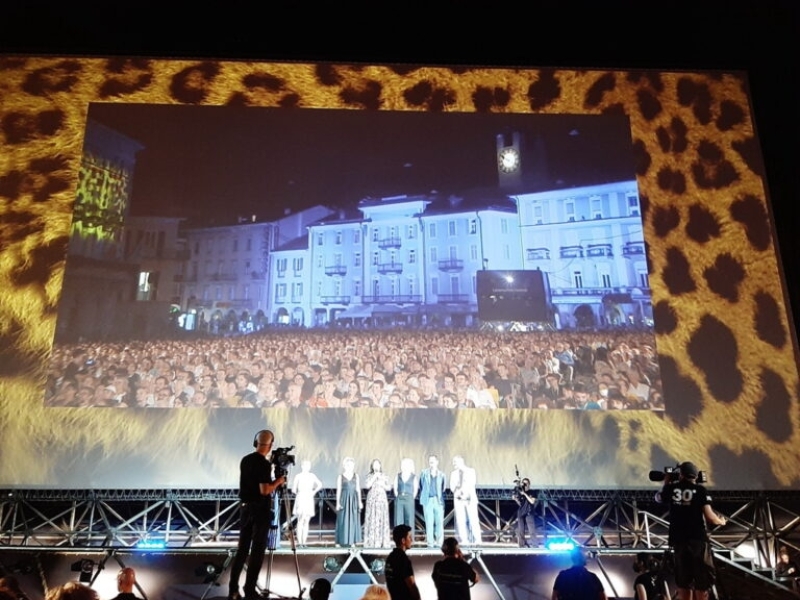Latin American cinema shines at Locarno
Sergio Ferrari | 16/08/2022
Brazil and Costa Rica dazzling
The only two Latin American films present, among the 17 selected in the international competition, swept four of the five main prizes at the 75th edition of the Locarno Film Festival, which took place between August 3 and 13 in this Swiss city.
Regra 34 (Rule 34), by the young Brazilian filmmaker Julia Murat (Brazilian-French co-production) won the Golden Leopard (Pardo de Oro), the main prize of the Swiss festival with a value of 75,000 francs (almost 80,000 dollars).
Frame of Regra 34
On her part, the Costa Rican filmmaker Valentina Maurel, took her film I have electric dreams, a co-production of Costa Rica, Belgium and France, to the podium with three medals. Maurel won the Leopard for the best direction - 20,000 francs -, catapulted the actress Daniela Marín Navarro to the Leopard for the best female performance and Reinado Amien Gutierrez, to the Leopard for the best male role.
Still from I Have Electric Dreams
The Italian comedy Gigi la legge, by Alessandro Comodin, won the special prize awarded by the International Jury, which was made up on this occasion by the Swiss producer Michel Merkt, the directors Prano Bailey-Bond, from Great Britain, Alain Guiraudie, from France and Laura Samani, from Italy, along with North American producer William Horberg.
In the Leopards of Tomorrow category, the Cuban film Soberane directed by Wara (from Brazil, but with film studies and residence on the Caribbean island), won the award for best international short film awarded by the festival in collaboration with Swiss public radio-television.
In the same category, the Golden Pardino for best short film director was awarded to Brazilian director Carlos Segundo for his film Big Bang (Brazil/France co-production).
The four major awards, as well as the two for young filmmakers, represent an explicit recognition of artistic Europe to Latin American cinema, which was thus, almost unexpectedly, at the center of the praise of cultural critics of this continent. That he could not fail to associate, also, the prize for his entire career awarded this year in Locarno to the Greek-French director Costa-Gavras and his films denouncing the Latin American dictatorships of the 70s and 80s, among others, Disappeared and Site status.
For an inclusive world
In the argument of its decision, the International Jury evaluated Regra 34 as «a bold and political work, destined to leave a mark. The body becomes a political object.
Giona Nazzaro, artistic director of the Locarno Festival, highlighted this award for the South American film: "This is an important Golden Leopard for a cinematography such as that of Brazil, which has defined key moments in the history of world cinema, a cinema that is at the forefront of defending the idea of a more inclusive and free world", he said in press statements upon learning of the jury's decision.
Giona Nazzaro's reflection was completed with her final balance of the edition that has just ended. “The prizes awarded by the juries and by the public (ed: The last dance of the Swiss filmmaker Delphine Lehericey) reflect the vision that led us to make our artistic decisions”.
Cinema has been confirmed at Locarno 75 as "an instrument to face the unspeakable and trauma". It also offers the possibility of approaching what seems distant, and with the inclusion of diversity, it shapes reality. The recognition of the audience and its openness to audiovisual communication are the right conditions to continue on this path, Nazzaro pointed out.
In this edition, the Locarno Festival presented 226 films, from a hundred countries, in a marathon of almost 500 screenings, including those in the Plaza Grande (Piazza Grande) that in some functions had the maximum presence of 8,000 spectators. The Plaza is one of the largest open-air “rooms” in the world.
The strong female youth presence
If a sign marked the 75th edition of the Swiss exhibition, it was the notable feminine and youthful presence.
Young female directors, thriving female actresses and scripts built from the perspective of a young woman contributed a plus to this particularly important event for independent and auteur cinema (in which the personality of the directors prevails over the pressures of the big studios international film).
The 2022 Golden Leopard, the Brazilian Rule 34, is a palpable example of this defiant female presence.
Sex is everywhere, and so are the rules. The name of the movie refers to Internet rule 34 which states that everything that exists in reality can find its porn counterpart online. So how to maintain the balance between desire, freedom and protection, for individuals and for society? Above all, in a complex and committed society like the current Brazilian one.
The film reflects on these and many other questions – with the humility of not giving answers – through the lead actress Simone (Sol Miranda), who is preparing to be a public defender while earning her living by monetizing her sexual performances through the camera and live chat.
As the Locarno Festival Newsletter explains, Simone is aware of her privileges as a qualified professional, powerful enough to feel sexually free, although she does not forget her vulnerability, as a woman of today and the product of an entire history of male supremacy. The rational lawyer has all the resources to analyze the issues of legality and consent, and the intelligent and self-aware woman knows how to find the answers to dodge questions about her desires shaped by centuries of racial and gender repression, and the values promoted by the sex industry. But as she explores lust and boundaries, Simone may choose to forget the rules.
I Have Electric Dreams, the Costa Rican film that won three other main trophies in this Locarnese edition, also expresses through the eyes of the adolescent Eva (in the outstanding performance of Daniela Marín Navarro) the youthful-feminine gaze of a family world worn out by the divorce of his parents, the unresolvable tensions with his mother and the feeling of love/hate towards his father, who can be, depending on the circumstances, poetic and sweet or violent and aggressive.
Thriving Ibero-America
Although with a limited quantitative presence, Locarno 2022 yielded to the evidence of the thriving presence of Ibero-American production.
In addition to the award-winning Latin American works, a Portuguese and an Argentine film made a mark on the festival even without having risen to the podium of the most significant awards.
The Portuguese Nação Valente (Brave Nation), co-produced with France and Angola, by director Carlos Conceiçao, stood out in the international selection and won the first prize awarded by the European Association of Cinemas and the second by the Youth Jury. A cry of rebellion and denunciation of the Portuguese colonial past, from the ghostly and accusing memory of the victims.
And the Argentine Matadero, by Santiago Fillol, which was part of the Filmmakers of the Present selection (the second most important in the festival), and received praise from some of the critics present in this city of Italian Switzerland.
The film is a moving drama where the blind obsession of a film director reaches the extreme, in order to conclude his film, of negotiating with the parastatal repressive power, condemning the young protagonists who were revolutionary militants to disappear. The film reaches full relevance in today's Argentina, where the tireless work to reconstruct memory (discover historical truth and promote restorative justice) involves the entire society and inspires magnificent artistic productions.

Comments to this:





